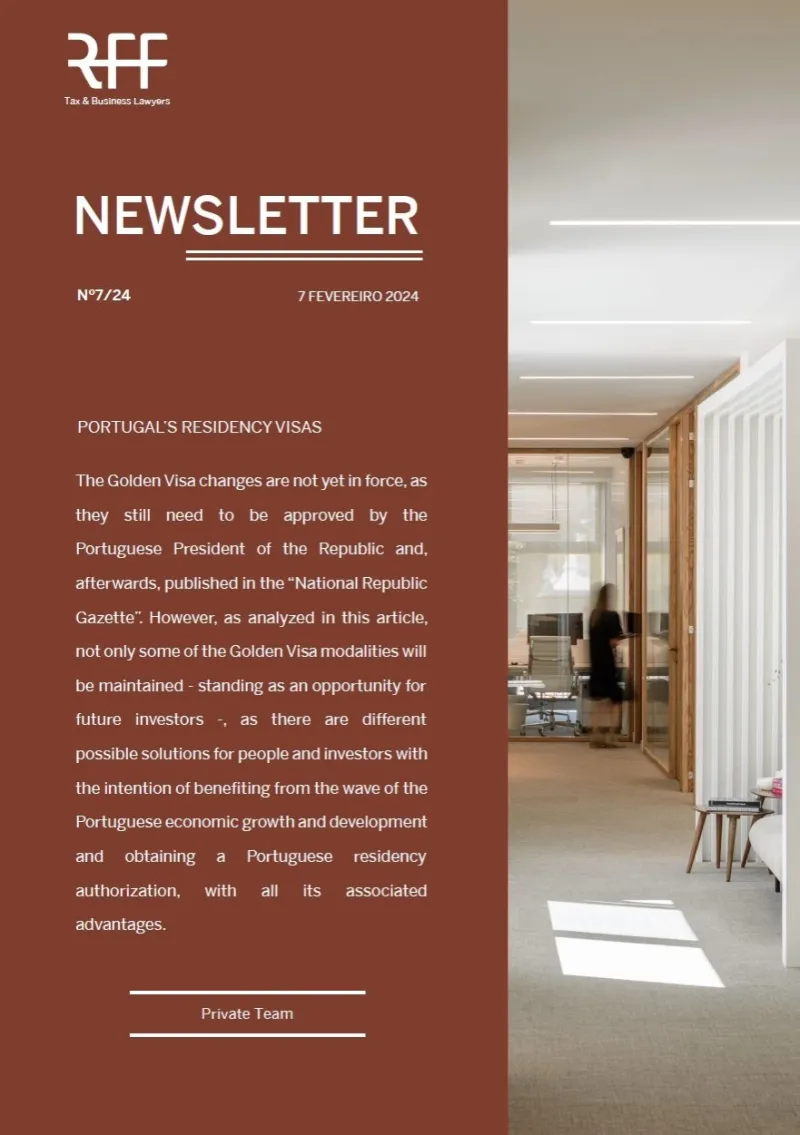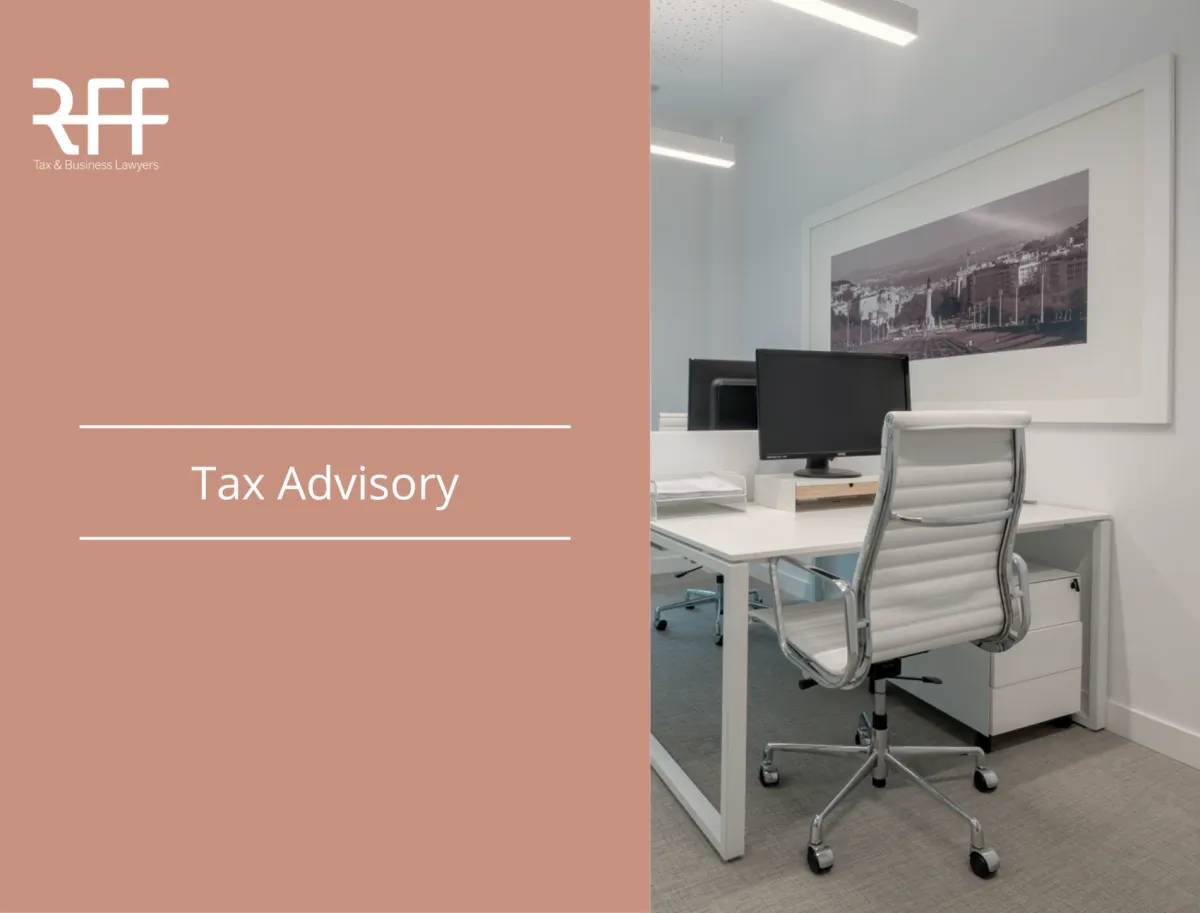Portugal’s Residency Visas

Portugal’s Residency Visas
The Golden Visa changes are not yet in force, as they still need to be approved by the Portuguese President of the Republic and, afterwards, published in the “National Republic Gazette”. However, as analyzed in this article, not only some of the Golden Visa modalities will be maintained - standing as an opportunity for future investors -, as there are different possible solutions for people and investors with the intention of benefiting from the wave of the Portuguese economic growth and development and obtaining a Portuguese residency authorization, with all its associated advantages.
WHY PORTUGAL
Not only for its climate, safety and beaches, but also due to the investment opportunities and the tax benefits that can offer, Portugal stands as an opportunity for international migrants.
Despite of the consequences of an inflation crisis around the world, the Portuguese economy is still showing signs of a good recovery after the Covid situation.
Thus, while the average economic growth of the European Union in 2022 stands at 3.6% (3.5% in the Eurozone), Portuguese GDP grew at an expressive rate of 6.7%. For 2023, the European Commission forecasts a Portuguese growth of 2.4%, more than the double of the averages predicted for the European Union (1%) and the Eurozone (1.1%).
Simultaneously, in April 2023, Portuguese unemployment rate was set on 6.4%.
In terms of investment opportunities, the Portuguese real estate market continues to grow, with the entry of new international companies and individuals.
In 2022, property investment in Portugal increased by 67%, with the highest growth in Southern European countries (Spain, Italy and Portugal).
Alongside with that, the possibility for people who were not Portuguese Tax Residents in the last 5 years of applying for the Non-Habitual Resident Tax Regime encloses undeniable advantages related to income taxation.
Under this Regime employment income and self-employment income rendered from high value-added activities are subject to PIT at a flat 20% tax and most of the income earned abroad will be exempted in Portugal, as long as certain conditions are verified.
The Golden Visa is also a potential attraction to foreign investors interested in obtaining a Residency Authorization that allow them to circulate in the Schengen Area and, ultimately, depending on other conditions, obtaining the Portuguese citizenship.
GOLDEN VISA RECENT LEGISLATIVE PROCESS (UPDATE)
Recently, there were some developments on the Golden Visa legislative process that will change this regime for future applications.
Due to the housing difficulties that the average working population was facing in Portugal, caused, along with other circumstances, by the effects of inflation on the housing market, the Portuguese Government announced a proposal of legislation with the intention of revoking the Golden Visa program.
This proposal was discussed and voted by the Portuguese Parliament, alongside with others measures connected to the intended damage management of the housing crisis in Portugal.
The final document approved foresees the termination of three Golden Visa modalities but maintains five investments as eligible for future Golden Visa applications.
WHICH GOLDEN VISA MODALITIES WILL END
If the President of the Republic approves this legislation, the following Golden Visa modalities will not be accepted for future applications:
- The transfer of € 1,500,000.00 to a Portuguese bank account;
- The acquisition of a real estate property; and
- The acquisition of a real estate property accompanied by the execution of rehabilitation works.
The legislation draft also states that the termination of these modalities will not affect pending applications, future renewals and family reunification requests.
WHICH GOLDEN VISA MODALITIES WILL BE MAINTAINED
In contrast, the following investments will still be valid for the Portuguese Golden Visa program:
- The creation of at least 10 jobs;
- Capital transfer on the amount equal to or above to € 500,000.00 for investing in research activities developed by public or private scientific research institutions integrated in the Portuguese scientific or technologic system;
- Capital transfer on the amount equal to or above to € 500,000.00, for the constitution or the reinforcement of the share capital of a commercial company with head office in the Portuguese territory, in conjunction with the creation or the maintenance of five permanent working jobs;
- Cultural donation in the amount of € 250,000.00 in projects certified by the Ministry of Culture;
- Investment of € 500,000.00 for the acquisition of units of investment funds whose maturity, at the moment of the investment, is, at least, of five years and, at least, 60% of the investments is realized in commercial companies with head office in the national territory (with the exclusion of real estate funds).
However, any of these investments will not be eligible if the investment is, directly or indirectly, destined to the Real Estate market or Real Estate companies.
THE RESIDENCY VISA: AN ALTERNATIVE TO THE GOLDEN VISA
Although the maintenance of certain Golden Visa modalities, some people who are interested in relocating to Portugal may find other Residency Visa (“D-Visa”) as the most appropriate solution for their specific case.
The Residency Visa has the advantage of, generally, not demanding an investment with minimum thresholds but requires longer minimum periods of staying in the Portuguese territory.
It can be requested before a Portuguese Consulate and, after obtained, allows its applicant to request a residency authorization before the Immigration Authorities in Portugal.
After 5 years of residence in Portugal, it is also possible to apply for the permanent residency authorization and/or for the Portuguese nationality.
Considering that there are different types of Residency Visas, applicants will need to select the right Residency Visa’s modality, according to the activity performed.
In this sense, you may find below some of the main modalities of this Residency Visa.
THE PASSIVE INCOME (D7)
The Passive Income Visa, well known as the “D7”, is one of the most attractive Residency Visas.
To obtain it, the applicants will only need to demonstrate income from a passive source, such as pensions, retirements, investment funds, stocks, or rental contracts, among other alternatives.
THE DIGITAL NOMAD
The Digital Nomad Visa was an innovation on the last changes on the Portuguese Immigration Legislation.
This Visa is aimed for people who work on a remote basis for non-Portuguese entities or individuals.
The applicant will be required to demonstrate average monthly earnings in the last three months from employment or self-employment activity in an amount of at least €3040.00 (value for 2023).
HIGHLY QUALIFIED WORKER VISA
The Highly Qualified Worker’s is a fast-tracked Visa created with the intention of attracting high value-added professionals and academics to work in Portugal.
Applicants will need to demonstrate the existence of an employment contract, a freelance contract or a promissory contract with a Portuguese entity or individual.
This sub-modality also includes the well-known “Tech-Visa”, which provides a fast-tracked process for expats employed in companies and start-ups certified by the Portuguese Agency for Competitiveness and Innovation.
In these cases, the company itself can initiate the relocation process on behalf of the employee.
EMPLOYEMENT ACTIVITY VISA (D1)
The Employment’s Visa requires the demonstration to the Portuguese Consulate of the existence of an employment contract or promissory contract between the applicant and a Portuguese entity or individual.
FREELANCER OR ENTREPRENEUR VISA (D2)
The Freelancer or Entrepreneur’s Visa is aimed for people who perform a freelance activity and already hold a contract, or a promissory contract signed with a Portuguese entity or individual, or for people who incorporate a Portuguese company.
Regarding the incorporation of a Portuguese company, it is not established any minimum threshold for the share capital nor for the investment executed.
FAMILY MEMBERS (REUNIFICATION)
Applicants of any type of Residency Visa will not need to wait to have their residency situation consolidated in Portugal to bring their family members.
In this sense, spouses or persons with whom the applicant is living in a civil partnership for more than 2 years, minor children or stepchildren and economic dependent adults (such as adult children and parents) will be entitled to request, at the same time of the main Residency Visa application, the Family Member Residency Visa.
CONCLUSION
Some of the Golden Visa modalities will be maintained - standing as an opportunity for future investors -, as there are different possible solutions for people and investors with the intention of benefiting from the wave of the Portuguese economic growth and development and obtaining a Portuguese residency authorization, with all the associated advantages.
***
Rogério Fernandes Ferreira
Duarte Ornelas Monteiro
Joana Marques Alves
Raquel Silva Simões
Ana Sofia Gariso
Amélia Carvela
Carlos Alcântara Neves
Nicolas Corrêa Simonini
